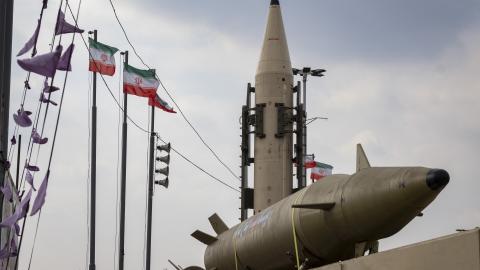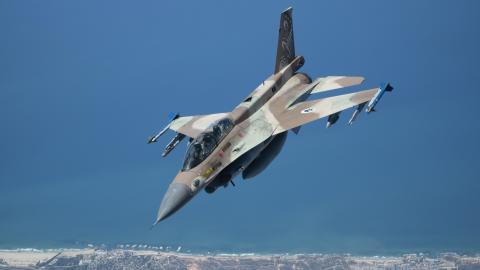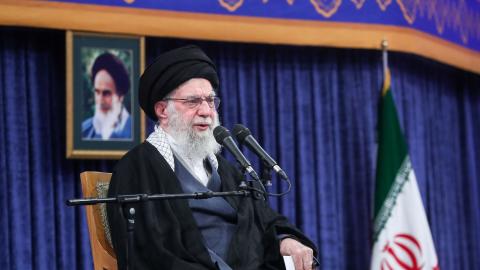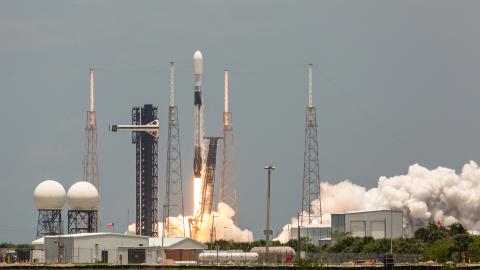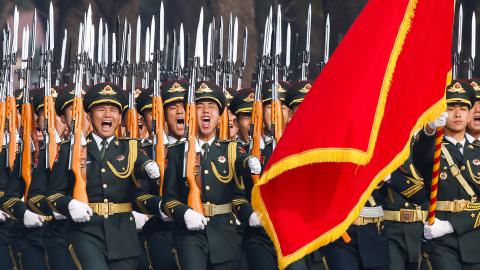The Honorable Douglas J. Feith is one of America’s best known national security practitioners. A lawyer by training, he began his career in the office of Senator Henry “Scoop” Jackson in the mid-1970s, going on to serve on the staff of the National Security Council and at the Pentagon during the Reagan administration. He left government service in the late 1980s to go into private law practice, but rejoined the government in July of 2001 to serve as Under Secretary of Defense for Policy in the administration of President George W. Bush—a position he held until August of 2005. Thereafter, he taught at Georgetown University’s School of Foreign Service and was associated with Harvard’s Kennedy School of Government and Stanford’s Hoover Institution. He currently serves as a Senior Fellow at the Hudson Institute, where he directs the Institute’s Center for National Security Strategies.
On May 26, 2015, Secretary Feith spoke with Journal editor Ilan Berman regarding the threat posed by the Islamic State, the Obama administration’s efforts to hammer out a nuclear deal with Iran, and the tragic course of the Syrian civil war. What follows is an edited transcript of his remarks.
__Over the past year, the terrorist group known as the Islamic State has erupted onto the international scene. Its battlefield successes in Iraq and Syria, and its radical, absolutist worldview, have resonated in many corners of the Muslim World, to the point that it has now surpassed al-Qaeda in terms of both prominence and reach. How grave is the threat it poses to American national security?__
It’s a serious threat. I view it as part of the broader Islamist attack on the United States and on the West in general. The Islamic State is a particularly worrisome part of that picture because it’s shown an interest in moving beyond simply being an ideological movement and terrorist group. It now controls substantial territory, population, and economic resources, and functions in the real world, claiming to be the universal caliphate. That’s part of the reason it’s excited so many people across the Muslim World, and is doing so well in recruitment.
If the Islamic State succeeds in taking either Baghdad or Damascus, two venerated Arab capitals that each served as the capitals of caliphates, it would enormously excite a lot of young people throughout the Muslim world and increase its strength and capabilities greatly. For this reason, the Islamic State is very much worth worrying about. The group has the economic resources, the political will and hostility, and an increasing capability to assert its revolution and do great harm to its enemies. And the Islamic State considers the United States an enemy.
__This brings us to Iraq. The recent advances made there by the Islamic State have made clear that the Iraq policy pursued by the Obama administration to date is woefully deficient. Yet new approaches—either military or diplomatic—are in short supply. What can Washington in fact do to help secure the Iraqi state?__
The Obama administration has blamed Iraq for failing to confront the Islamic State successfully. Secretary of Defense Ash Carter recently said that Iraqi forces performed so poorly in the field because they lacked the will to fight. There may be something to that analysis, but the U.S. administration bears some responsibility too for the Iraqi government’s failure.
The Obama administration helped create this problem through its passivity, and now justifies further passivity by saying that it doesn’t have any good options. In Iraq, Syria and elsewhere, if we had been more farsighted and active early on, we might have been able to improve the situation through relatively minor actions. Now, in order to improve matters, we need to take major actions. U.S. officials who weren’t inclined to take minor steps can’t now be expected to take major actions. So these problems are metastasizing.
If we stick with the premises of the Obama national security doctrine, there’s almost nothing that can be done. The only way the United States can begin to remedy the situation in the Middle East, and elsewhere, is to adopt a comprehensively different approach to national security affairs. A complete overhaul is required.
__The Islamic Republic of Iran has emerged as one of the most prominent players in today’s fight against the Islamic State. What are Iran’s priorities in the campaign it is currently waging in Iraq? And is cooperation with Tehran on this issue in fact possible?__
In the Middle East today, we have a number of large strategic concerns. One of them is something we have already discussed: the Islamic State. But Iranian revolutionary activity is also a major challenge for the United States. Iran is deeply hostile to the United States for ideological reasons. It thinks of itself as a revolutionary government, and wants to dominate its region and exert influence beyond it.
Iran is a strategic problem, and not—as the Obama administration seems to think—a strategic partner and a strategic opportunity. We should oppose Iran at the same time that we are opposing the Islamic State. The fact that we have some interests that overlap with Iranian interests doesn’t make Iran a sensible partner for us.
__The Obama administration has made the conclusion of some sort of agreement over Iran’s nuclear program a centerpiece of its second-term foreign policy agenda. By all indications, the United States—together with the other P5+1 powers—is now closing in on that goal. But how durable an agreement is this deal likely to be? And what are its implications for America’s other priorities and equities in the Middle East?__
Something durable is not what’s intended. What the Obama administration intends is for this deal to somehow handle the political problems posed by Iranian nuclear ambitions. Its perspective is short term. Its approach will be as ineffective in constraining the Iranians as arms control agreements of this type have been in limiting actions and capabilities of non-democratic regimes over the last century. I don’t know if it would be possible to coerce this Iranian regime to stop developing nuclear weapons, but I don’t believe it’s possible to get Iran to do so by means of a deal that relies on the Iranian regime’s voluntary cooperation.
Iran has defied a large part of the world in developing and pursuing its nuclear program. This agreement absolves their efforts of sin. It suggests that Iran has successfully stared down the international community. Many medium-sized powers will conclude that the era when nuclear weapons were in the hands of only a small number of large powers is over. That will convince countries like Egypt, Turkey, and the Gulf States that they need nuclear capabilities of their own. The proliferation effect will extend beyond the Middle East. In a few years, we may see an explosion, so to speak, in the number of nuclear powers.
We have lived for 70 years since the end of World War II without any wars involving nuclear detonations. Non-proliferation policy has been an astonishing success. The pending deal with Iran undermines that success and, by making proliferation far more likely, will make nuclear war far more likely. It is grimly ironic that a U.S. president who championed “global zero”—the notion that the world can rid itself of nuclear weapons— is determined to make a deal with Iran that will have the effect of destroying the world’s non-proliferation architecture. That will be the deal’s effect even if Iran complies with its promises and even if it behaves moderately after acquiring nuclear weapons. And I don’t believe that either of those “ifs” is realistic.
__Syria’s brutal civil war is now nearly four-and-a-half years old, but contrary to the expectations of most Western observers, the regime of Bashar al-Assad still remains ensconced in Damascus. How stable is Assad’s rule, really? And what—if anything— should the United States do to shape the contours of that conflict?__
What got us into this situation in the first place is that the Obama administration did not want to see Syria as an element of the Iran problem. Here, too, Administration thinking is driven by the idea that Iran is a strategic partner and a strategic opportunity for the United States. So the White House wasn’t inclined to see the Syrian civil war, where Assad was fighting brutally to preserve his dictatorship and doing so with heavy assistance from Iran, as Iran-related. U.S. officials looked at the war as a free-standing problem with no broader strategic context. They assumed that Assad wouldn’t be able to remain in power.
Early on in the anti-Assad revolt, a small amount of encouragement and military support from the United States to the rebels opposing Assad might have led to consolidation of the rebel forces. It might have closed off the option for other states to arm extremist Islamist groups entering the fray. And it might have encouraged Syrians on the political fence to join the rebels before the civil war became large scale. That might have given rise to a non-extremist rebel coalition that could have swept away Assad early on. I don’t know if that would have happened, but it was never tried. Instead, President Obama chose laissez-faire. In the absence of American engagement, support for Islamist extremist groups came in from around the region. That altered the nature of the revolt against Assad.
Now we’re at a point where Assad’s victory would be damaging for the United States, and a great strategic victory for Iran, but Assad’s defeat could be a major success for the Islamic State. Our options are worse than they appeared to be a few years ago. The U.S. government has maneuvered itself into a corner. Almost nothing that happens there will be good for the Syrian people, or for American interests.
__Originally published in the Spring/Summer 2015 edition of The Journal of International Security Affairs__


